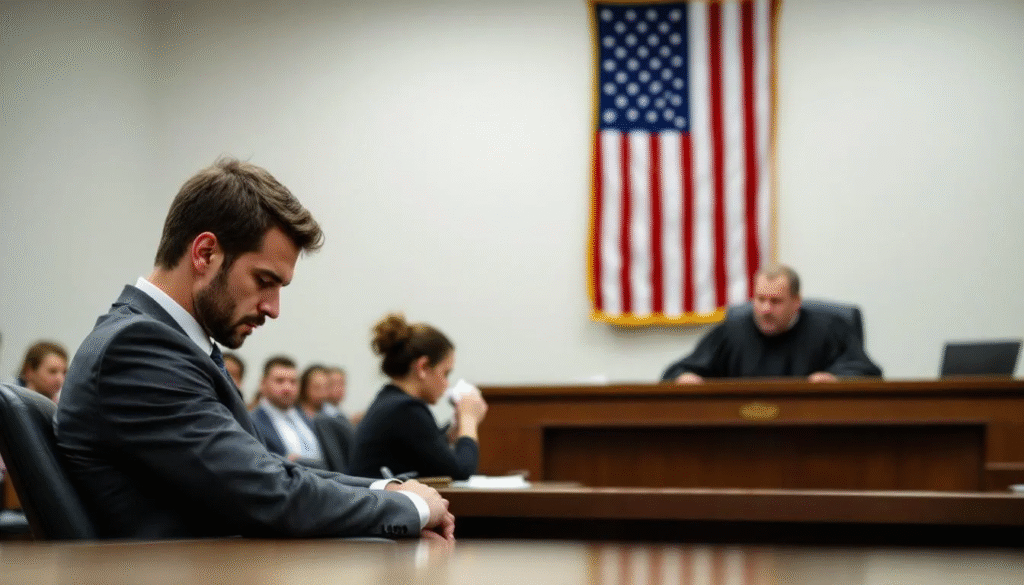What Happens if a Domestic Violence Victim Doesn’t Show for Court in Colorado

Many domestic violence victims in Colorado believe their criminal case will simply disappear if they don’t show up to court. This dangerous misconception can lead to serious legal consequences for the alleged victim while the domestic violence case often continues regardless of their participation. Once a domestic violence case is reported, law enforcement and the prosecutor take over the situation, removing the victim’s ability to press charges unilaterally. Understanding what actually happens when a domestic violence victim doesn’t appear for court in Colorado is crucial for anyone facing this difficult situation.
Colorado operates under a specialized domestic violence court system with a “no-drop prosecution” policy, meaning prosecutors typically pursue domestic violence charges even when victims are uncooperative or fail to appear. Unlike other criminal cases where victim cooperation is essential, domestic violence cases can proceed using alternative evidence, including police reports, 911 recordings, medical records, and testimony from other witnesses. The decision to continue with prosecution rests with the district attorney’s office, regardless of the victim’s wishes.
The consequences for failing to appear in a domestic violence case extend far beyond what many victims expect. From potential arrest warrants to contempt of court charges, victims who don’t show up for court face their own legal jeopardy while the underlying domestic violence accusation continues through the criminal justice system. The Colorado judicial system may be suspicious of victims who want to retract their statements, suspecting they may be under pressure from the defendant.
Local Support Resources
For local resources and victim support in Colorado Springs, victims can contact the Colorado Springs Police Department Victim Assistance Unit. Additionally, the Colorado Judicial Branch provides information on court procedures and victim rights statewide. The Colorado Department of Public Safety offers victim services and safety resources, while the Colorado Springs Community Victim Advocate Program supports victims throughout the legal process.
Immediate Consequences of Not Appearing
When a domestic violence victim fails to appear for a scheduled court hearing in Colorado, several immediate consequences typically follow. The judge may issue a bench warrant for the victim’s arrest, particularly if the alleged victim was properly served with a subpoena requiring their attendance. This bench warrant authorizes law enforcement officers to arrest the victim and bring them before the court, regardless of when or where they encounter them. A victim ignoring a subpoena can be found in contempt of court, which can result in up to 180 days in jail and a fine of $500.
The court can hold victims in contempt for failing to comply with a valid subpoena, which carries potential jail time of up to 6 months under Colorado law. This contempt charge represents a separate criminal matter from the original domestic violence case and can result in its own criminal record for the victim. While judges often exercise discretion in domestic violence situations, the legal authority to impose these domestic violence penalties exists and is sometimes utilized.
Courts may postpone hearings when key victims fail to appear, allowing additional time for law enforcement to locate and serve the alleged victim with proper legal notice. However, this postponement doesn’t guarantee case dismissal — it often simply delays proceedings while the prosecution prepares to proceed with alternative evidence.
The prosecutor may request a continuance to secure the victim’s testimony, particularly in cases where victim cooperation is deemed essential for proving guilt beyond a reasonable doubt. District attorneys in Colorado have significant resources to locate uncooperative victims, including working with victim advocates and law enforcement to encourage participation in the criminal case.
In many situations, the case proceeds without victim testimony if sufficient evidence exists through other means. Colorado’s domestic violence court system specifically anticipates victim noncooperation and has developed procedures to handle cases where the alleged victim chooses not to participate in prosecution efforts. If the victim is the only witness whose testimony is essential, the case may be dismissed if they fail to show up, although this is not guaranteed.
Subpoena Requirements and Legal Obligations
Victims served with subpoenas are legally required to appear in Colorado courts, regardless of their personal wishes about pursuing the domestic violence charge. A subpoena represents a court order, not a request, and failing to comply constitutes contempt of court under Colorado Revised Statutes. This legal obligation exists even when the alleged victim no longer wants to press charges against the defendant.
The law recognizes only specific valid excuses for failing to appear after being subpoenaed, including serious illness documented by medical records, genuine family emergencies with proper documentation, or physical inability to travel to court due to circumstances beyond the victim’s control. Financial hardship, fear of testifying, or simply not wanting to participate do not constitute legally sufficient excuses under Colorado law.
Victims must notify the court immediately if unable to appear, providing proper documentation to support their absence. This notification should occur as soon as possible after learning of the inability to attend, preferably before the scheduled hearing date. Courts may accept telephonic testimony or other accommodations in legitimate circumstances, but these arrangements require advance coordination with the prosecutor and court personnel.
An important misconception involves no-contact orders or protection orders — these do not excuse victims from testifying when properly subpoenaed. The legal obligation to appear as a witness exists separately from any protective measures in place. The court can modify protection orders temporarily to allow testimony while maintaining other protective provisions.
Crime victims who ignore subpoenas risk their own arrest and prosecution for contempt, creating additional legal problems beyond the original domestic violence case. Understanding these legal obligations helps victims make informed decisions about their participation in the criminal justice process.

Impact on the Domestic Violence Criminal Case
Colorado domestic violence cases rarely get dismissed simply because victims don’t appear for court proceedings. The state’s no-drop policy means prosecutors often proceed without victim cooperation, using alternative evidence to prove the defendant’s guilt beyond a reasonable doubt. This approach recognizes the complex dynamics of intimate partner violence and the various pressures victims face regarding participation in prosecution. Most crimes of domestic violence are prosecuted as misdemeanors in Colorado, but a charge that results in serious injury may be prosecuted as a felony.
Cases can continue using 911 recordings, which often capture real-time accounts of domestic violence incidents while the alleged victim was under stress and unlikely to fabricate details. These recordings frequently include background sounds, emotional distress indicators, and immediate descriptions of the alleged crime that prosecutors use as evidence even without live testimony from the victim.
Police reports provide detailed documentation of officer observations at the scene, including descriptions of injuries, property damage, the victim’s demeanor, and statements made shortly after the incident occurred. Law enforcement officers can testify about what they witnessed, photographed, and documented during their investigation, creating a comprehensive evidence picture that doesn’t require victim participation.
Medical records from emergency room visits, urgent care facilities, or doctor’s appointments following alleged domestic violence incidents serve as powerful evidence of injuries consistent with the domestic violence charge. Healthcare providers can testify about observed injuries, treatment provided, and statements the victim made about how injuries occurred.
Prior recorded statements from the victim may be admissible under Colorado evidence rules, particularly if they qualify as excited utterances made shortly after the traumatic event or were given to law enforcement during the initial investigation. Body camera footage from responding officers often captures victim statements and observable injuries in real-time, providing compelling evidence for prosecution.
The prosecution may also rely on testimony from family members, neighbors, co-workers, or other witnesses who saw or heard the domestic violence incident. These other witnesses can provide crucial testimony about what they observed, heard, or learned about the alleged crime without requiring the victim’s direct participation.
Prosecutor’s Options When Victim Fails to Appear
District attorneys in Colorado have several strategies available when domestic violence victims fail to appear for court proceedings. The prosecutor may request a bench warrant to compel the victim’s appearance, particularly when their testimony is considered essential for proving the case beyond a reasonable doubt. This approach demonstrates the state’s commitment to pursuing domestic violence charges regardless of victim cooperation.
Prosecutors frequently proceed with trials using alternative evidence and witness testimony, drawing upon the comprehensive evidence collection that occurs in most domestic violence investigations. This “victimless prosecution” approach has become increasingly common and successful in Colorado courts, resulting in convictions even without direct victim testimony.
The district attorney may file a motion to dismiss charges only in rare circumstances where the case cannot proceed without victim testimony and no alternative evidence exists to support the domestic violence conviction. However, this outcome is uncommon given the thorough evidence collection typical in domestic violence cases and the availability of other witnesses and documentation.
Seeking continuances to attempt to locate and secure victim attendance represents another prosecutorial option, though courts typically limit the number of postponements available for this purpose. Prosecutors may work with victim advocates, law enforcement, and family members to encourage voluntary victim participation before resorting to more coercive measures.
When legally permissible, prosecutors use the victim’s previous statements or depositions given during earlier proceedings. These prior statements may be admissible under various hearsay exceptions, allowing the prosecution to present the victim’s account of events without requiring live testimony in court.
The prosecution’s approach often depends on the strength of available evidence, the severity of the alleged crime, and the defendant’s criminal record. Repeat offenses or cases involving serious injuries typically result in more aggressive prosecution efforts, including pursuing bench warrants for uncooperative victims.
Protection Order Implications
Criminal protection orders remain in effect regardless of whether the domestic violence victim appears for court proceedings. These mandatory protection orders, issued automatically in most Colorado domestic violence cases, continue to legally bind the defendant even when the alleged victim chooses not to participate in prosecution efforts. A domestic violence conviction can affect your parental rights, employment opportunities, and ability to obtain a loan.
Defendants must continue following all protection order conditions, including staying away from the victim’s home, workplace, and other specified locations. Violations of protection orders can result in additional criminal charges separate from the underlying domestic violence case, creating new legal jeopardy for defendants regardless of the original case outcome. Domestic violence convictions trigger federally mandated restrictions related to gun ownership, government employment, military service, and citizenship status.
The victim’s absence from court does not invalidate existing restraining orders or suggest that the victim no longer needs protection. Colorado courts recognize that victims may choose not to participate in criminal proceedings for various reasons while still requiring legal protection from the alleged abuser.
Protection order modifications require separate court proceedings distinct from the criminal case, and victims can request changes to protective measures even if they don’t participate in the criminal prosecution. This separation allows victims to maintain safety protections while exercising choice about their role in criminal proceedings.
Law enforcement continues to enforce protection orders with the same authority regardless of victim participation in the criminal case. Violations result in immediate arrest and new criminal charges that can be prosecuted even if the original domestic violence case faces challenges due to victim noncooperation.

Colorado’s Fast-Track Procedure Considerations
Colorado’s fast-track domestic violence court procedures may experience delays when victims fail to appear for key hearings, though courts work to minimize disruptions to the expedited timeline. These specialized courts prioritize moving domestic violence cases through the system quickly to provide timely protection for crime victims and swift accountability for defendants.
Arraignment proceedings typically continue even without victim presence, as defendants must be formally informed of charges and enter pleas within constitutional time limits. The victim’s absence at arraignment rarely impacts these initial proceedings, which focus primarily on informing defendants of charges and setting bail conditions.
Pretrial conferences may be rescheduled to accommodate essential victim testimony, though prosecutors often proceed with available evidence rather than indefinitely postponing proceedings. Courts balance the need for victim input with the importance of maintaining case momentum and protecting community safety.
Trial dates may face postponement if victim testimony is deemed essential for the prosecution’s case, though judges typically limit continuances to prevent indefinite delays. The availability of alternative evidence often allows trials to proceed on schedule despite victim noncooperation.
Colorado courts prioritize victim safety while maintaining case progression, sometimes using victim advocates to communicate with absent victims about the importance of their testimony and available support services. This approach attempts to encourage voluntary participation rather than relying solely on legal compulsion.
What Victims Should Do Before Missing Court
Domestic violence victims facing court appearances should contact victim advocates immediately to discuss concerns about testifying and explore available options for support during proceedings. These trained professionals can explain the court process, discuss safety planning, and help victims understand their rights and obligations regarding testimony.
Notifying the prosecutor’s office as soon as possible about inability to attend court hearings allows attorneys to explore alternatives and potentially arrange accommodations that make testimony possible. Early communication often prevents the need for bench warrants and contempt proceedings while ensuring victims receive appropriate support.
Victims should request court accommodations such as closed courtrooms, victim support persons, or testimony via closed-circuit television when safety concerns make traditional testimony problematic. Colorado law provides various protections for domestic violence victims who fear retaliation for their testimony.
Seeking legal counsel helps victims understand their rights and obligations regarding testimony while exploring options for their own legal protection. Many victims benefit from having their own attorney separate from the prosecutor to advocate specifically for their interests throughout the process.
Victims may consider victim impact statement alternatives if direct testimony proves problematic, allowing them to communicate with the court about the crime’s impact without undergoing cross-examination. These written statements can influence sentencing while avoiding the stress of live testimony.
The key is proactive communication with court personnel, prosecutors, and victim advocates rather than simply failing to appear and hoping the case disappears. Colorado’s domestic violence court system offers various accommodations for victims who engage with the process rather than avoiding it entirely.
Legal Representation and Victim Rights
Domestic violence victims have the right to victim advocates during court proceedings, and these trained professionals provide emotional support, case information, and assistance navigating the complex court system. Victim advocates can accompany victims to court, explain procedures, and help ensure victims understand their rights throughout the process.
Colorado law provides specific protections for crime victims who fear retaliation for their testimony, including enhanced penalties for intimidating witnesses and additional charges for defendants who threaten or harm victims. These protections extend beyond the immediate case to include ongoing safety measures and legal remedies.
Court-appointed attorneys may represent victims in contempt proceedings if they face legal consequences for failing to appear after being subpoenaed. This separate representation ensures victims have adequate legal counsel distinct from the prosecutor who represents the state’s interests in the criminal case.
Victim compensation programs may cover costs associated with legal representation, court appearances, and other expenses related to participating in domestic violence prosecutions. These programs recognize the financial burden that court participation can place on victims and provide resources to ensure economic barriers don’t prevent testimony.
Experienced Colorado domestic violence attorneys can explain victim obligations and rights while helping victims navigate the complex intersection of criminal law, family law, and victim protection measures. A free consultation with a knowledgeable attorney often provides crucial information for victims facing difficult decisions about court participation.

Understanding these rights and available resources empowers domestic violence victims to make informed decisions about their participation in criminal proceedings while ensuring they receive appropriate legal protection and support throughout the process.
Conclusion
When domestic violence victims don’t show for court in Colorado, the consequences extend far beyond simple case dismissal. Victims face potential arrest warrants, contempt charges, and up to six months in jail, while the criminal case often continues using alternative evidence under Colorado’s no-drop prosecution policy. The state’s specialized domestic violence court system anticipates victim noncooperation and has developed comprehensive procedures to pursue convictions using police reports, 911 recordings, medical records, and other witness testimony.
The complexity of Colorado’s domestic violence legal framework means that victims who simply avoid court proceedings without proper legal guidance often find themselves in worse positions than those who engage proactively with the system. Protection orders remain enforceable regardless of victim participation, defendants continue facing prosecution through alternative evidence, and victims may encounter their own criminal liability for failing to comply with subpoenas.
Rather than avoiding court entirely, domestic violence victims should work with victim advocates, seek legal counsel, and explore available accommodations that make testimony safer and more manageable. Colorado’s legal system provides numerous protections and support services for victims who engage with the process, while those who simply disappear often face unintended consequences that compound their already difficult circumstances.
If you’re a domestic violence victim facing court proceedings in Colorado, contact an experienced Colorado Springs domestic violence charges dropped lawyer for a free consultation to understand your rights, obligations, and available options for protecting yourself throughout the legal process.
